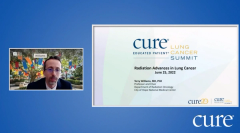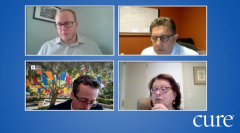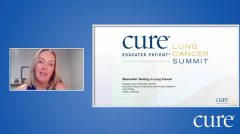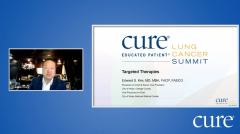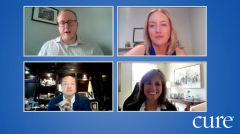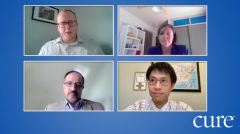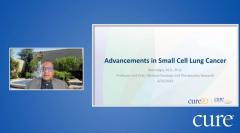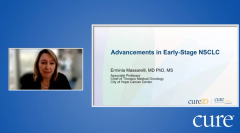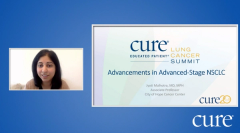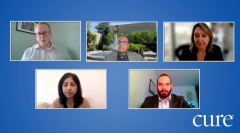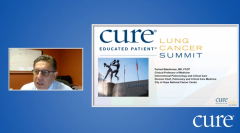
Educated Patient® Lung Cancer Summit Overcoming Barriers to Receiving Biomarker Testing Panel: June 25, 2022
Watch Nikki Martin, Dr. Ying-Chun Lo and Dr. Hossein Borghaei discuss overcoming barriers to receiving biomarker testing during the CURE Educated Patient Lung Cancer Summit.
Episodes in this series

This panel was moderated by Ryan McDonald, and featured Nikki Martin, from LUNGevity; Dr. Ying-Chun Lo, from Mayo Clinic; and Dr. Hossein Borghaei, from Fox Chase Cancer Center.
McDonald: Dr. Borgaei, to start, I'd like to ask who should be getting biomarker testing done? And when should they be doing this?
Borghaei: Hello, everyone, and thanks for the invitation. So I think based on what we heard, just in the last panel, in my view, at least in the world of lung cancer, everyone with a diagnosis of lung cancer should get biomarker testing. We have seen and know that we use biomarkers for selection of patients for various treatments, regardless of the stage of the disease. And what I mean by that is, in the world of EGFR mutation-positive disease, we have data for the use of targeted therapy in the adjuvant setting post-surgery and, obviously, in the metastatic setting, we've been using biomarker selection for our patients. So we are at the at a place where everyone with a diagnosis of lung cancer needs to have biomarker testing done.
McDonald: Okay, thank you, Nikki, can you discuss disparities we currently see among patients that are associated with biomarker testing in lung cancer?
Martin: Yes, thank you. And thank you for having me on this program today. So there are a number of recent studies in the last two years or so that have looked at disparities in access to biomarker testing for non-small cell lung cancer patients. And some areas that might lead to lower rates of testing are the type of hospital – community-based hospitals being less likely to be ordering next generation sequencing, comprehensive biomarker testing for people with lung cancer.
Another factor is race, of course, as Black and African American patients are less likely than White patients, in a recent study, to receive comprehensive biomarker testing with next generation sequencing, I think at a rate of around 10%. From that particular study, also, there's differences in access to testing based on insurance coverage, with Medicaid patients being around 40% less likely than privately-insured patients to be tested for any biomarkers. So that's not even just talking about comprehensive biomarker testing with next generation sequencing, but even just single gene testing.
And then finally, we've done some research recently and found that physicians that have a perception of a patient having a lower health literacy level are also less likely to order the correct guideline-concordant biomarker testing for their patients as well.
So there are a number of barriers that people face in ordering the testing and receiving the testing, but also there are barriers later on in terms of receiving the test results. Terri said it sounded like she had trouble getting a copy of her results. We find that people from lower socioeconomic levels are less likely to receive the results and are less likely to understand the results as explained by their physician. And finally, (they are) less likely to have confidence to ask their providers why testing wasn't ordered if it wasn't ordered in the first place.
So a number of different barriers for people. And that's why it's so important to attend these types of sessions and know that it is your right to ask for biomarker testing, receive biomarker testing, receive a copy of your results and have those results explained to you in a way that you can understand.
McDonald: Dr. Lo, can you discuss the role of the pathologist when it comes to biomarker testing and the multidisciplinary approach to lung cancer care?
Lo: Thanks, Ryan. Thanks for inviting me. So the pathologist, traditionally we know we make the diagnosis, we look at the biopsy, we'll look at tissue and make that analysis. But nowadays, the diagnosis is more much more complicated. So all lung cancer now has different subtypes. We already know (about non-small cell and small cell lung cancer). But beyond that now is a whole big thing of biomarker testing.
So biomarker testing, most are performed in the pathology department, where the molecular pathologists interpretate those datasets and then generate reports. Proper molecular testing now has to include the pathologist, especially in molecular pathology, on the team that is taking care of patients together because those tests are interpreted to deliver the information to the clinical team. It has become much, much more important than it used to be.
So right now, lung cancer care is always in the multidisciplinary setting, especially like we have in those tumor boards. It not only includes oncologists, radiation oncology, radiology, pulmonologist, but now pathology is taking a more and more important role to guide and help the test team. What does that mean in those like 20 pages of results? Not all places have that easy access to pathology and molecular pathologists. So (we need to) make sure the practice has those assets and making sure patients have access to those resources has become very important nowadays.
McDonald: Thank you. Dr. Borghaei, there's always a possibility where a patient's doctor may not have mentioned biomarker testing to them. So how do you advise patients to go about bringing it up?
Borghaei: Again, I think this was addressed somewhat at the last panel and we just (heard) about it from Ms. Martin, that patients should be able and feel comfortable that they have a right to ask for testing. So I think the easiest place to bring this up is at the time of initial diagnosis, or at least the first one or two visits. I would say my preference is the very first visit, of course, is to simply ask, “Is there the possibility for targeted therapy for the kind of cancer that I have?” And I think that might alert the physician that the molecular testing is a component that should be discussed and consider this as part of the discussion with the patient.
So I don't think it's something to shy away from. I don't think it's something to feel uncomfortable about. I think, in my view at least, in the US, the majority of medical oncologists that take care of patients are aware of the data.
There definitely are barriers, which sometimes are system wide. That does not provide an excuse for us not to do molecular testing. But I really don't think that people are trying to avoid it. So as a patient or caregiver, I think, again, you're not being disrespectful, you're not being problematic or anything to that extent. I think it is a part of your right to know what kind of cancer you have, what kind of treatment options you have and if targeted therapies are a possibility and what the molecular data show. So I think all of those are very reasonable question to ask, and to have a dialogue with your physician.
McDonald: Thank you. Dr. Lo, we're obviously talking about overcoming barriers to biomarker testing. So why is it so important to have education around this topic of biomarker testing? And can you discuss advocating for the right test for every patient?
Lo: So, because every patient is different and every test is also different, when we talk about personalized medicine, I'm choosing the proper testing strategy. It becomes a very big discussion, because as we know, there's a large panel, there's a small size panel, there's a single gene assay. There's sequencing like next generation sequencing. There's RT PCR, there's FISH, there's immunohistochemistry stains. So all these have a lot of nuances. And their tissue requirements are also different.
As I say: Different patients have different clinical needs. Some need a very urgent, really quick result. Some can wait a little bit. But the more comprehensive results in some have enough tissue, some do not. So (those who do not have) a lot of knowledge (on biomarker testing) behind them need a lot of education and communication.
And I think that education includes three layers. The first layer is the oncologists’ and pathologists’ communication. So for the oncology practice to know what your pathology lab has, and for the pathology lab to communicate with the oncology group, like what tests we have, the strengths and weakness of each of them, so that the team can discuss with the patient to know what's the proper testing strategy. The second layer is the patient education. So we have to let the patients and everyone know that it's your right to get (biomarker testing). And to know those tests are helpful for making important clinical decisions, including targeted therapy or immunotherapy or chemotherapy. And then a third layer is the policy and insurance payers. I let them know if those tests are mandated for research or for just that academic study. Those are standard to finding important biomarkers for patient care. So (we need to) be able to let the insurance company (know so they are) willing to pay for this rather than ask patients to pay out of pocket. It's very important to change the concept of those insurance companies from thinking molecular testing us just research and to understand (that it is) a patient care need.
McDonald: Okay, thank you. Nikki, in terms of LUNGevity, what types of resources do you have for patients to learn more about biomarker testing?
Martin: Okay, we have a lot of resources on the topic of biomarker testing. First, I'll just point out, there is a peer-to-peer support program. So if you're wondering how is the experience of getting biomarker testing or waiting for results, which can be stressful waiting for your results, and you want to talk to someone who's been in your shoes or you're a caregiver, once you want to talk to someone we have a peer-to-peer support program that will connect you with someone with a similar situation, similar story. But I like to always point that out.
On the purely didactic side, we have a lung cancer 101 website, you go to lungevity.org. And you can find a lot of information on lung cancer 101, which is a section of our website. You can also go on to our website and look for biomarker testing booklets, fact sheets and videos and questions to ask your doctor.
We're also currently working on a booklet that is designed to help people read their biomarker testing results report and understand what are the key sections of the report and questions you can ask your doctor about your report. And so that should be finished and on our website in the next two months or so. And I hope that if you remember and you have a chance to check it out, it could be useful to you. Also all of our materials on biomarker testing is…in Spanish too, so we're trying to make them very accessible to as many people as possible.
And finally, we have a public awareness campaign called No One Missed. So if you go to noonemissed.org, you can also find there more information for really anyone to learn about why lung cancer and biomarker testing are so uniquely joined and essential to make sure biomarker testing happens for lung cancer patients.
McDonald: Okay, thank you. Now to bring it all together, this question is for all three of you. How can we overcome these barriers to biomarker testing from both the provider and advocacy side? I'll start Dr. Borghaei, can you address this topic?
Borghaei: It is really a broad, complicated topic. There are so many aspects and facets to this question. It is something that I think we need patient advocacy, which we have on the table. Now we need physician engagement, which I think we have, to a great extent. We need communication between the health care team who was caring for a patient, which would do a reasonable job of it, but not as well as it should be. We need regulatory reform, as you heard, so that there is no insurance or out-of-pocket costs. I cannot imagine asking the patient to pay out of pocket for something that is so essential in deciding how the treatment should be. So I think that definitely has to go away.
We need to come to an understanding that getting molecular testing is as important as knowing what the stage of cancer is, before you start your treatment. I mean, we wouldn't think about giving treatment without knowing what stage we're dealing with. I mean, it shouldn't be the same when it comes to biomarker testing and molecular testing for our patients. I differ a little bit from my colleague in that I think everyone should have comprehensive panel testing done. And I do understand that the timing is important. So I like what he mentioned here that maybe we can do a panel kind of quickly to help us decide the treatment.
But I think comprehensive testing is absolutely essential. I think the blood-based platforms can be a great equalizer. Because one of the issues we deal with in the world of lung cancer, even to this day, is that sometimes our patients do not have adequate biopsy taken at the time of initial diagnosis because of the perceived difficulties or real difficulties in obtaining adequate tissue. So combining a liquid biopsy panel with tumor can actually help a lot in multiple settings. And many of us, at least in the academic settings have started doing both platforms. So this needs everyone coming together, the whole village has to be involved, to make this a reality to make it as smooth as possible to cover as many patients as possible so that the disparities that we're facing today don't persist. So, again, I know I'm giving a very broad answer, but the question is very broad and general.
Lo: I echo with Dr. Borghaei. This needs a whole team and a whole village to conquer those barriers. So I think the awareness of the importance of biomarker testing is what we have been working on in different layers. So in the medical practice, we let everyone in the field know the importance of these. And in communicating that to patients, again, patients now can read all these and understand that this is needed. And then again, for the regulatory part by the insurance company, those are important. So we all need everyone's advocy and awareness of this to make those happen. But I think on the academic side, most (providers) are now aware of this, but I think the regulation, the insurance partners are lagging behind. I think that's one of the very big hurdles we have to jump through.
Martin: I think Dr. Borghaei and Dr. Lo hit on everything that needs to happen, which is still so much. The science behind precision medicine has progressed so rapidly and is going to continue to progress. But the implementation of precision medicine within hospitals and health care systems around the country is just struggling to keep up. And so we do need providers to facilitate more education for providers so that they can stay aware and create some sort of ease so that they can ensure that the practice of their medicine is in line with guidelines.
But the only thing that hasn't been mentioned is to continue to encourage people who are diagnosed with lung cancer and their family members to do what they can to keep educated as well. Connect with groups like KRAS Kickers or other advocacy organizations. Connect with LUNGevity. And stay abreast of the changes that are also happening in this space because you may be able to advocate for yourself as well as rely on what your provider is doing to stay up to date on the changes in medicine. And I think that it's through empowering our own selves to work with our own medical providers that we can also take some steps forward.
Transcription edited for clarity.
For more news on cancer updates, research and education, don’t forget to

